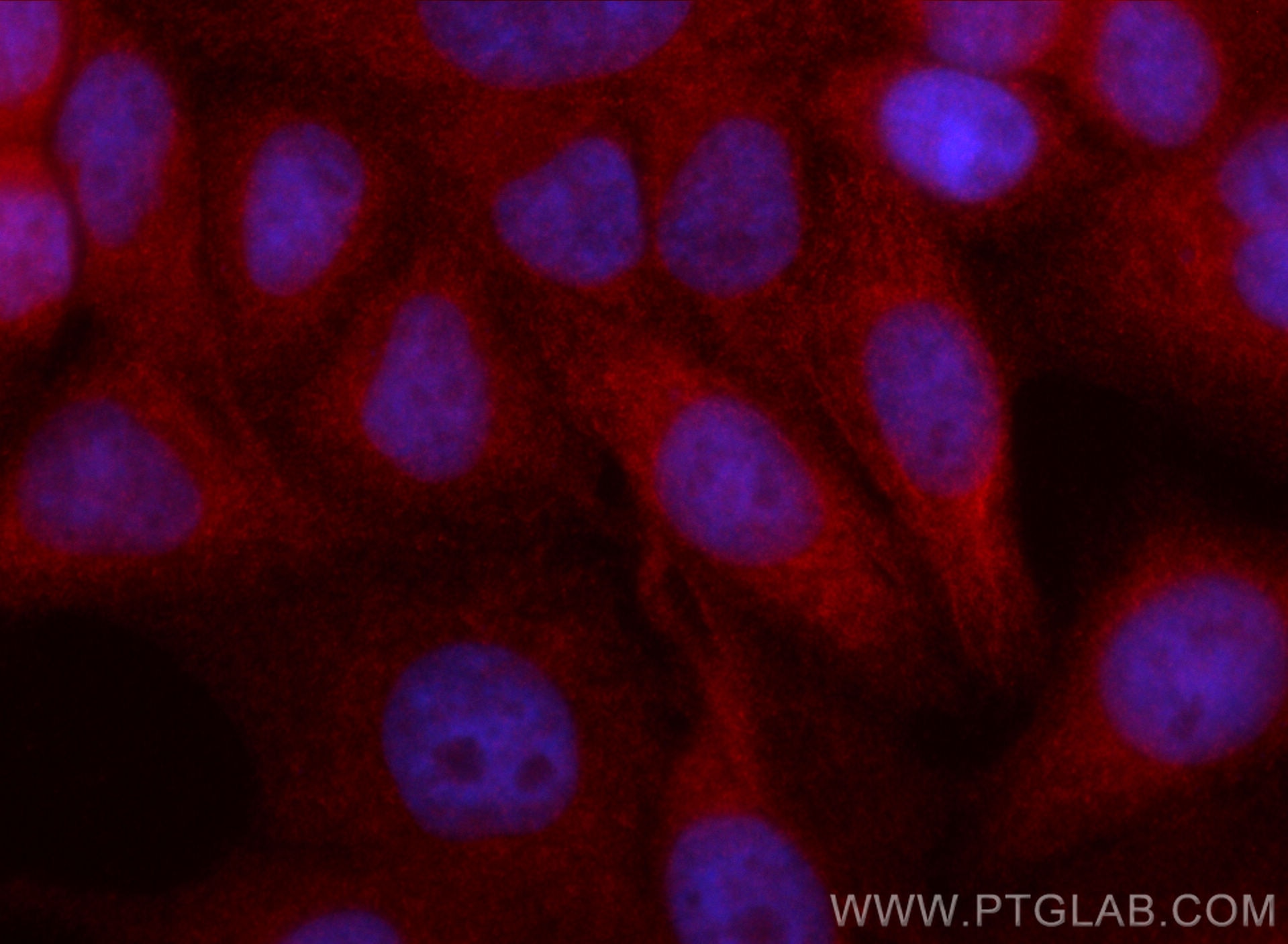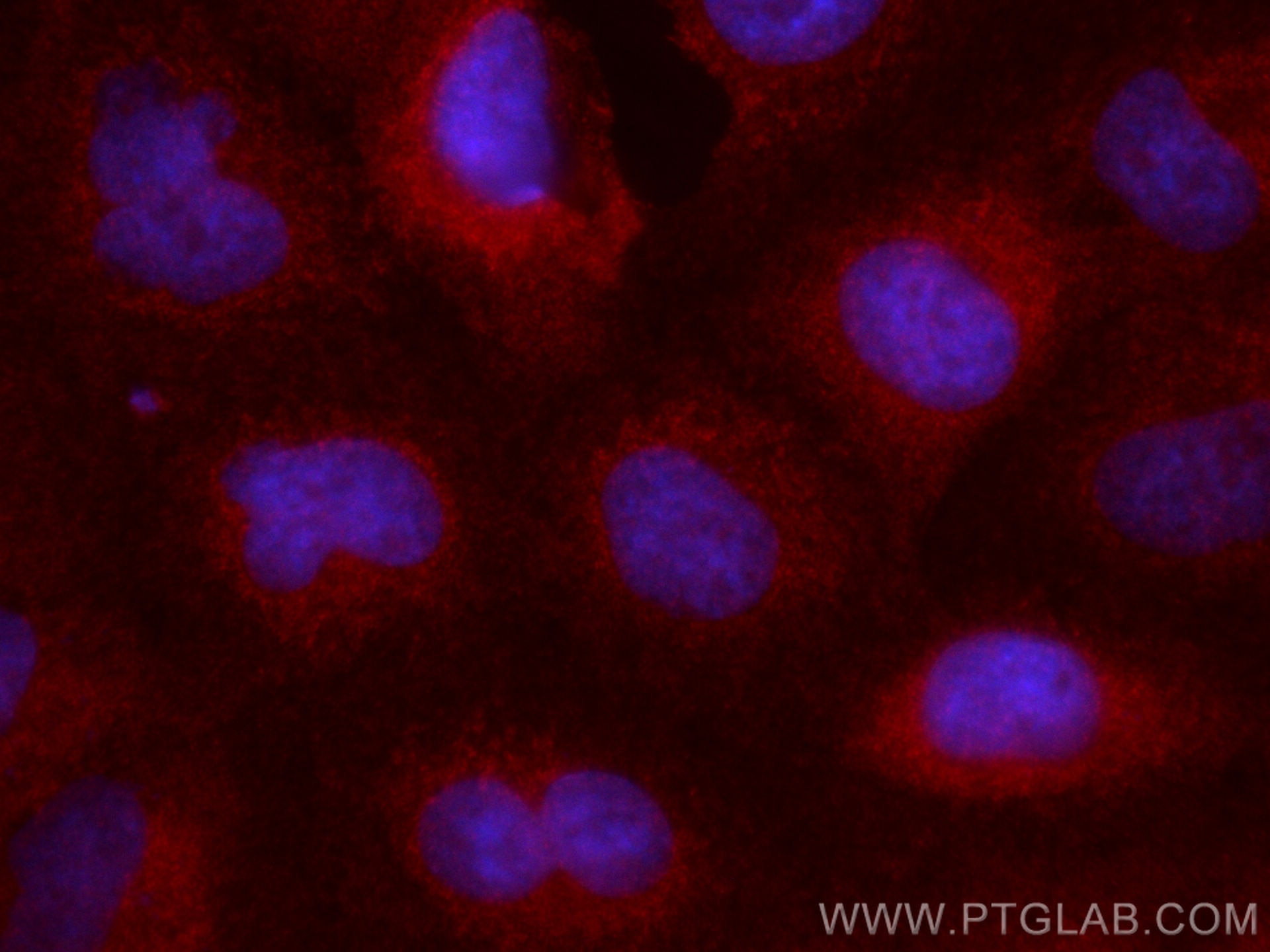- Featured Product
- KD/KO Validated
NLRX1 Polyklonaler Antikörper
NLRX1 Polyklonal Antikörper für IF/ICC
Wirt / Isotyp
Kaninchen / IgG
Getestete Reaktivität
human, Maus, Ratte
Anwendung
IF/ICC
Konjugation
CoraLite®594 Fluorescent Dye
Kat-Nr. : CL594-17215
Synonyme
Geprüfte Anwendungen
| Erfolgreiche Detektion in IF/ICC | HepG2-Zellen, A549-Zellen |
Empfohlene Verdünnung
| Anwendung | Verdünnung |
|---|---|
| Immunfluoreszenz (IF)/ICC | IF/ICC : 1:400-1:1600 |
| It is recommended that this reagent should be titrated in each testing system to obtain optimal results. | |
| Sample-dependent, check data in validation data gallery | |
Produktinformation
CL594-17215 bindet in IF/ICC NLRX1 und zeigt Reaktivität mit human, Maus, Ratten
| Getestete Reaktivität | human, Maus, Ratte |
| Wirt / Isotyp | Kaninchen / IgG |
| Klonalität | Polyklonal |
| Typ | Antikörper |
| Immunogen | NLRX1 fusion protein Ag11000 |
| Vollständiger Name | NLR family member X1 |
| Berechnetes Molekulargewicht | 975 aa, 108 kDa |
| Beobachtetes Molekulargewicht | 100-110 kDa |
| GenBank-Zugangsnummer | BC013199 |
| Gene symbol | NLRX1 |
| Gene ID (NCBI) | 79671 |
| Konjugation | CoraLite®594 Fluorescent Dye |
| Excitation/Emission maxima wavelengths | 588 nm / 604 nm |
| Form | Liquid |
| Reinigungsmethode | Antigen-Affinitätsreinigung |
| Lagerungspuffer | PBS with 50% glycerol, 0.05% Proclin300, 0.5% BSA |
| Lagerungsbedingungen | Bei -20°C lagern. Vor Licht schützen. Nach dem Versand ein Jahr stabil. Aliquotieren ist bei -20oC Lagerung nicht notwendig. 20ul Größen enthalten 0,1% BSA. |
Hintergrundinformationen
NLRX1 (Nucleotide-binding oligomerization domain, leucine-rich repeat containing X1) is a member of the NOD-like receptor (NLR) family and is unique among NLRs due to its localization to the mitochondrial matrix. NLRX1 is a negative regulator of innate immunity, particularly in viral infections. It interacts with the mitochondrial antiviral signaling protein (MAVS) to attenuate antiviral responses. NLRX1 has been implicated in various diseases, including multiple sclerosis, colorectal cancer, and ischemia-reperfusion injury. Its role in controlling inflammation and mitochondrial function makes it a potential therapeutic target.
Protokolle
| PRODUKTSPEZIFISCHE PROTOKOLLE | |
|---|---|
| IF protocol for CL594 NLRX1 antibody CL594-17215 | Protokoll herunterladen |
| STANDARD-PROTOKOLLE | |
|---|---|
| Klicken Sie hier, um unsere Standardprotokolle anzuzeigen |



